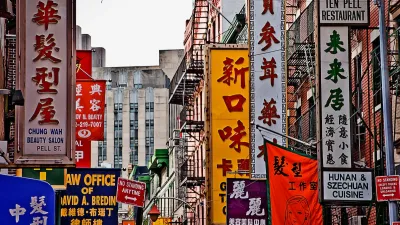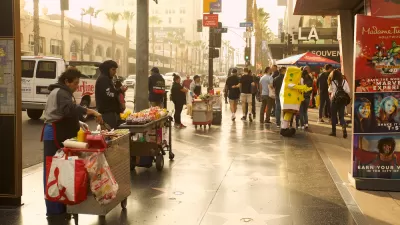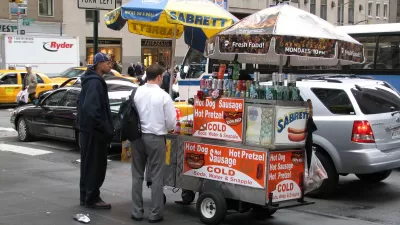New York has become a concentration of the super-wealthy, and soaring real estate values are driving out supermarkets. Will street vendors be able to fill the gap?
"Over the last six years, researchers report, the number of supermarkets in New York has shrunk by a third. Three of the city's top food chains -- D'Agostino, Gristedes, and Key Food -- "have each closed about a dozen stores since 2000."
Why are New York's supermarkets shutting down? No one needs to call in the FBI to investigate. Analysts already know the answer. New York is simply becoming too unequal -- too economically top-heavy -- to sustain the basics of modern American middle class life.
The enormous wealth now concentrated in New York has sent property prices so high that supermarkets can no longer afford to rent their urban spaces. The city's 'soaring real estate values,' the Washington Post notes, 'are prompting property owners throughout the city to shutter grocery stores and sell to developers.'
Those developers are bringing to market condos and businesses that cater to the ever-richer ranks of New York's awesomely affluent. No mystery why. These affluents have congregated in New York at levels seen nowhere else in the United States.
One telling statistic: The average weekly salary in New York County -- Manhattan -- hit $2,821 in 2007's first quarter, the equivalent of $147,000 a year. That figure over tripled, for that time period, the national average weekly take-home.
Amid all this inequality, only those at the tippy top of the income ladder can afford to live stress-free and comfortably in Manhattan. The market has priced out most everyone else. If you can't afford to shell out $1 million, you haven't been able, since 2004, to afford the average Manhattan apartment. On the city's Upper East Side, apartments with three or more bedrooms average $6.6 million.
Meanwhile, New York mayor Michael Bloomberg, the billionaire who made his fortune selling information services to Wall Street, is working hard on solutions to the city's widening supermarket crisis. The Bloomberg administration, according to news reports, is planning 'to license 1,500 street vendors to sell fruits and vegetables.'"
FULL STORY: New Yorkers Get Priced Out of Grocery Stores

Planetizen Federal Action Tracker
A weekly monitor of how Trump’s orders and actions are impacting planners and planning in America.

Maui's Vacation Rental Debate Turns Ugly
Verbal attacks, misinformation campaigns and fistfights plague a high-stakes debate to convert thousands of vacation rentals into long-term housing.

San Francisco Suspends Traffic Calming Amidst Record Deaths
Citing “a challenging fiscal landscape,” the city will cease the program on the heels of 42 traffic deaths, including 24 pedestrians.

Amtrak Rolls Out New Orleans to Alabama “Mardi Gras” Train
The new service will operate morning and evening departures between Mobile and New Orleans.

The Subversive Car-Free Guide to Trump's Great American Road Trip
Car-free ways to access Chicagoland’s best tourist attractions.

San Antonio and Austin are Fusing Into one Massive Megaregion
The region spanning the two central Texas cities is growing fast, posing challenges for local infrastructure and water supplies.
Urban Design for Planners 1: Software Tools
This six-course series explores essential urban design concepts using open source software and equips planners with the tools they need to participate fully in the urban design process.
Planning for Universal Design
Learn the tools for implementing Universal Design in planning regulations.
Heyer Gruel & Associates PA
JM Goldson LLC
Custer County Colorado
City of Camden Redevelopment Agency
City of Astoria
Transportation Research & Education Center (TREC) at Portland State University
Jefferson Parish Government
Camden Redevelopment Agency
City of Claremont





























